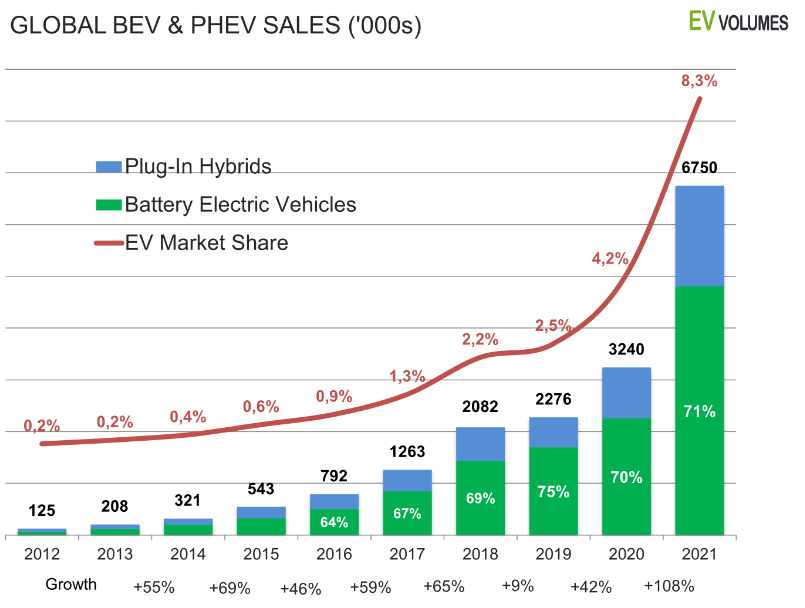Table of Contents
Introduction :
- India is focusing on sustainable development while promoting electric vehicles (EVs) to address climate change concerns.
- The government is supporting the EV industry, creating demand-side incentives, and setting emission targets for 2030.
KeyPointers
- Indian Government’s ‘Make in India’ Initiative: India is striving to become a manufacturing hub for various sectors, particularly electric vehicles (EVs), by promoting local production through the ‘Make in India’ initiative.
- Projected Growth: Despite being in the early stages, the Indian EV industry is projected to reach 17 million units by 2030, with a significant increase in sales compared to the previous years.
- Government Initiatives: The Indian government has introduced initiatives like FAME India (Faster Adoption and Manufacturing of Hybrid and Electric Vehicles), PLI (Production-Linked Incentive) schemes for the automotive industry, and incentives for customers to encourage local production of EVs.
- Foxconn’s Entry: Taiwanese contract manufacturer Foxconn plans to establish a production line for two-wheeler EVs in India, indicating foreign investment and interest in the Indian EV market.
- Diverse Range of Brands: Several well-known brands like TATA Motors, Mahindra, Hyundai, Ola Electric, Ather Energy, Okinawa, TVS, MG, Hero Electric, and others have ventured into the Indian electric vehicle segment.
- Investment Influx: Both global and local auto manufacturers are heavily investing in EV production in India, showcasing the industry’s growth potential.
- Government’s Electrification Commitment: The Indian government is committed to achieving 30% electrification of total mobility by 2030, driving interest from domestic and foreign manufacturers.
- Policy Framework: India’s encouraging policy framework for local EV production has attracted investments from around the world.
- Environmental Commitment: India’s commitment to reducing carbon emissions and combating climate change has been a significant driver for the adoption of EVs.
- Charging Infrastructure Development: The country is actively working on establishing a network of charging stations, making EVs more accessible and convenient for consumers.
- Renewable Energy Focus: India’s emphasis on renewable energy sources like solar and wind power ensures a sustainable and clean source of electricity for EV charging.
- Manufacturing Prowess: India’s manufacturing capabilities, expanding market, and EV-friendly policies position it as a promising hub for EV production on a global scale.
Mahindra & Mahindra (M&M)
- Entered the electric vehicle sector in 2022 with XUV400.
- Bookings for XUV400 EV started in January 2023.
- Large-cap stock with a profitability score of 7.1/10 on Scorecard
Tata Power
- Diverse Energy Portfolio: Tata Power has a diverse energy portfolio, including thermal, hydro, solar, and wind power, making it a significant player in India’s power sector.
- Renewable Energy Focus: The company is actively expanding its renewable energy capacity and is committed to sustainability, with a growing emphasis on green energy sources.
Exide Industries Ltd
- Known for manufacturing batteries for regular and electric vehicles.
- Stepped into EV-specific battery manufacturing.
- Small-cap stock currently undervalued compared to the market average.
Tata Motors
- One of the oldest automobile manufacturers in India.
- Offers 3 different electric vehicles: Tata Nexon EV Prime, Tata Nexon EV Max, and Tata Tigor EV.
- Market cap of ₹1,68,935.86 crore.
Hero MotoCorp Ltd
- Leading player in the EV two-wheeler market.
- Offers 8 EV models: Photon, Optima, NYX, Eddy, Flash, Atria, AE-29, and AE-3.
- Market cap of ₹49,147.58 crore.
Amara Raja Batteries Ltd
- Second-largest producer of automotive batteries in India.
- Plans to construct a Gigafactory with an investment of $800 million to $1 billion for lithium-ion cells.
- Stock valued at ₹597.35 as of April 24, 2022.
Power Grid Corporation of India Ltd
- India’s largest Electric Power Transmission Utility.
- Operates EV charging stations in 7 different Indian cities.
- Low-risk large-cap stock with a volatility of 1.64x compared to Nifty.
Olectra Greentech Ltd
- Subsidiary of Megha Engineering and Infrastructures Ltd.
- Stock valued at ₹673, with 2.49% growth since the previous year.
- Specializes in electric bus manufacturing with energy-saving features.
Tata Chemicals Ltd
- Provides crucial components to electric vehicle companies.
- Projected return of 20.44% exceeds the 3-year CAGR of 17.46%.
- Expected earnings growth for the next year is 72.24%.
Motherson Sumi Systems Ltd
- One of India’s largest auto parts manufacturers.
- Expanding into parts required for electric vehicles.
- 5-year CAGR growth of 14.01% and a profitability score of 7.6/10 on ‘Scorecard’.

Electric Vehicle Battery Significance:
- EV batteries are crucial, accounting for 30-40% of an EV’s cost.
- They impact driving range, ownership costs, and performance, driving EV adoption.
Global EV Battery Market:
- The global EV battery market is expected to grow by USD 53,626.86 million between 2022 and 2027, with a CAGR of 19.57%.
- Factors contributing to this growth include expanding EV applications, consumer demand, automotive industry transition to EVs, and technological advancements.
China’s Dominance in EV Batteries:
- China controls about 75% of the world’s EV battery manufacturing capacity.
- Many Western automakers, including Tesla and General Motors, source batteries from Chinese companies like CATL.
India’s EV Initiative:
- India aims to become a manufacturing hub for EVs under the ‘Make in India’ initiative.
- Promoting EVs powered by sustainable energy sources is seen as a solution to reduce air pollution and greenhouse gas emissions in India.
Global EV Battery Sales (2021):
- Global EV battery sales exceeded 6.5 million units in 2021, indicating substantial growth compared to 2020.

Investment Opportunities in EV Battery Stocks:
Investment Rationale:
- EV adoption in India is on the rise.
- Key to acceleration is a comprehensive ecosystem approach.
- Batteries are a critical component.
- India needs investments in high-performing, affordable batteries.
- Opportunity for India to become a global EV market leader.
Considerations:
- Assess suitability for the chosen mutual fund.
- Thorough research on EV battery manufacturers.
- Evaluate the performance of the mutual fund schemes.
Conclusion:
- EV battery stocks offer compelling growth potential.
- Diversified options in mutual funds for exposure.
- Careful consideration and research are essential for investors.
MCX Crude Oil
External links
Disclaimer:
The information provided in this blog post is for educational and informational purposes only. It should not be construed as financial advice or a recommendation to buy or sell any securities. Always do your own research and consult with a qualified financial advisor before making investment decisions











